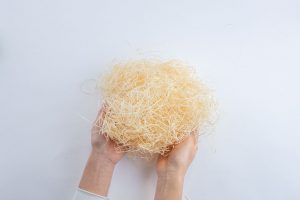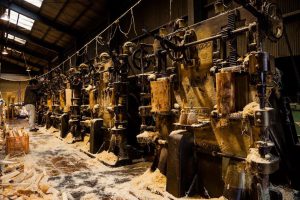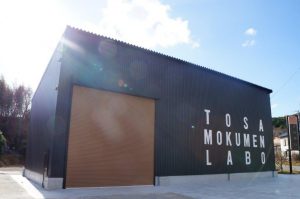森からの贈りもの:日本で唯一の木毛(もくめん)づくり/ Gift From the Forest: Japan’s Only Mokumen Maker / 森林的礼物:制作日本唯一的木毛
高知県土佐市にある有限会社戸田商行さんは、国内唯一の「木毛(もくめん)」を製造している事業所です。
木毛を知っていますか?木毛は木材を細長く削りまとめたもので、商品を保護する緩衝材として昔から使われており、日本各地で盛んに製造されていました。しかし、安価なプラスチック製の緩衝材が広く使われるようになると製造工場は減り、製造会社は戸田商行さんだけになりました。

戸田商行さんが木毛を作り続けている理由は、木毛が地域資源を活かした環境保全・循環型の商品であり、森林率84%の高知県の森づくりに役立つこと、そして何より、先代から引き継いだ確かなモノづくりの技術と知恵を継承するという強い思いがあるからです。
そのため、木毛に使う木材は高知県内で伐採された木材にこだわり使っており、つくられた商品は高知県J-VER制度でカーボンオフセットクレジットとして認定されております。
木毛に使われている樹種は松、杉、檜(ひのき)、楠(くすのき)の4種類で、原木を自社で加工し製造しています。汎用性のあるバーカーで樹皮を取り除いた後は、木毛製造機にあわせてカットします。そして、創業時から約60年間稼働している5台の製造機と新たに導入した1台を使い、職人が丁寧に木の目を見ながら削り続けます。削られた木毛は水分が多く、しっとりとしていて、そのままでは使えません。乾燥するために使われる熱源は、製造の過程で出た樹皮や削りくずなどの廃材です。その後、乾燥した木毛は計量・梱包されて国内外へ搬送されていきます。工場では一日最大1トンの木毛を製造していますが、木材は余すところなく使われ、製造工程でごみになる木材はありません。

木毛は3サイズ(幅や厚さ)があり、そのサイズによる弾力や樹種の特徴を活かした使われ方をしています。例えば、一番薄い幅1mm×厚さ0.1mmの松の木毛は人形の詰め物や皮の薄い果物の緩衝材に、同じ幅で厚さが0.15mmのものは、果物やハム、チーズ、陶器や瓶などの緩衝材に使われています。
また、それぞれの木の持つ特徴を活かした商品開発も行われており、檜の香りのリラックス効果を活かした香り袋、楠の防虫効果を活かしたシューズキーパー、松の白さを活かしたリースやブーケづくりなど、活用の幅は広がっています。
最近は地域の持続可能性への意識の高まりとともに、木毛は自然素材を使った緩衝材として注目を集めておりますが、戸田商行さんの森づくりへの思いと、創業者から伝わる職人の技術により生み出された木毛は、緩衝材という脇役でありながら、高知県の84%の森づくりを伝えるメッセンジャーであり、森からの贈り物なのです。
有限会社戸田商行: https://www.toda-shoko.com
■Gift From the Forest: Japan’s Only Mokumen Maker
Toda Shoko Co., Ltd. in Tosa, Kochi, is the only company in Japan that produces mokumen (wood wool). What is mokumen? Put simply, it is a bundle of long, slender wood shavings which has been traditionally used to protect goods, and which was once manufactured all over Japan. However, with the spread of cheap plastic-based packing materials, the number of factories producing mokumen began to decrease, until eventually only Toda Shoko was left.
Toda Shoko continues to produce mokumen because it is an easily recyclable and environmentally friendly product that uses local materials, it helps with forest management in Kochi, which is 84% forests, and most importantly, they have a strong desire to pass on the reliable manufacturing techniques and knowledge they inherited from their predecessors.
For that reason, all of the wood they use is sourced from inside Kochi, and the products they make are recognized as carbon offsets under the Kochi J-VER Scheme.
Four varieties of trees are used in the production of mokumen — pine, Japanese cedar, Japanese cypress and camphor tree — and all the materials are processed in-house. After removing the bark with a general-purpose barker, the wood is cut to fit into the mokumen manufacturing machines. Then, using the five machines that have been in operation since the company opened sixty years ago, as well as one more bought recently, the craftsmen and women carefully shave it into strips while watching the grain. However, the resulting mokumen is too moist to use as-is, and must be dried. The fuel used for the drying process is the leftover scraps from production like tree bark and wood chips.
After drying, the mokumen is weighed, packed and shipped both domestically and internationally. The factory can produce up to one ton of mokumen daily, and because every part of the raw wood is used in the production process, it doesn’t produce any wood waste.
Mokumen comes in three sizes, and is used for different applications depending on the elasticity from its size and the qualities of the wood used. For example, the thinnest pine mokumen is 1 mm wide and 0.1 mm thick, and is used as a filling for dolls and as a packing for fruit with thin skin. On the other hand, the same width but 0.15 mm thick is used as a packing material for things like fruit, ham, cheese, ceramics and bottles.
In addition, the company is expanding its product line to include products that utilize the unique properties of each kind of wood in various ways. Some examples are a sachet that takes advantage of Japanese cypress’s calming scent, shoe trees that take advantage of camphor tree’s insect-repellent property, and wreathes and bouquets that use the whiteness of pine.
With the recent increase in people’s consciousness toward sustainability, interest has grown in mokumen as an all natural packing material. And while the mokumen made from Toda Shoko’s passion for forests and crafting skills passed down from their founder certainly fulfills that role, it is also so much more. It is a gift from the forest, and a messenger conveying Kochi’s 84% forestation.
Toda Shoko Homepage: https://www.toda-shoko.com
■森林的礼物:制作日本唯一的木毛
位于高知县土佐市的有限公司户田商行,是日本唯一一家生产「木毛」的工厂。
你知道木毛吗?木毛是木材的细长切割,长期以来用于保护商品的缓冲材料,以前在日本各地广泛生产。然而,随着廉价塑料缓冲材料的广泛使用,制造的工厂数量逐渐减少,目前只剩户田商行了。
户田商行继续生产木毛的原因是,木毛是活用当地资源的环境保全・循环型产品,有利于森林覆盖率为84%的高知县建设森林,另外更重要的是,因为有强烈的希望从前代手中继承可靠的制造技术和智慧的原因。
因此,生产木毛的木材只使用高知县砍伐的木材,生产的产品被高知县J-VER系统认证为碳抵消信用。
木材中使用的树种有松树、杉树、桧树和楠木四种,公司自行加工和生产原木。用多功能的制材机去除树皮后,再用木毛制造机切割。自成立以来五台木毛制造机已经运行了大约60年,又新引进了1台机器,工匠们小心翼翼地看着树的年轮,进行切削。切削的木毛因为有很多水分,潮湿,所以不能直接使用。用于干燥的热源是制造过程中产生的废料,如树皮和木屑。干燥好的木毛被称重和包装,并运送到日本和国外。工厂每天生产多达一吨的木毛,但木材会全数使用,在制造过程中不会产出木材垃圾。
木毛有三种尺寸(宽度和厚度),根据它们的大小和树种的特点使用。例如,最薄宽度1mm×厚度0.1mm的松树木毛用在娃娃的馅料或皮薄的水果的缓冲材料中,以相同的宽度和厚度0.15毫米的用于如水果、火腿、奶酪、陶器和瓶子的缓冲材料。
此外,还开发了利用树木特点的产品,利用桧木香味开发的有放松效果的香味袋、利用楠木的驱虫效果而开发的鞋撑、利用松树的白色开发的花束等,其应用范围正在扩大。
最近,随着人们对区域可持续性的认识的提高,木毛作为使用天然材料的缓冲材料而备受关注,户田商行对建设森林的热爱,用创始人传授的工匠技术生产的木毛,虽然只是缓冲材料的配角,但是在传达着高知县84%森林建设的信息,是森林赋予的礼物。
有限公司户田商行:https://www.toda-shoko.com



